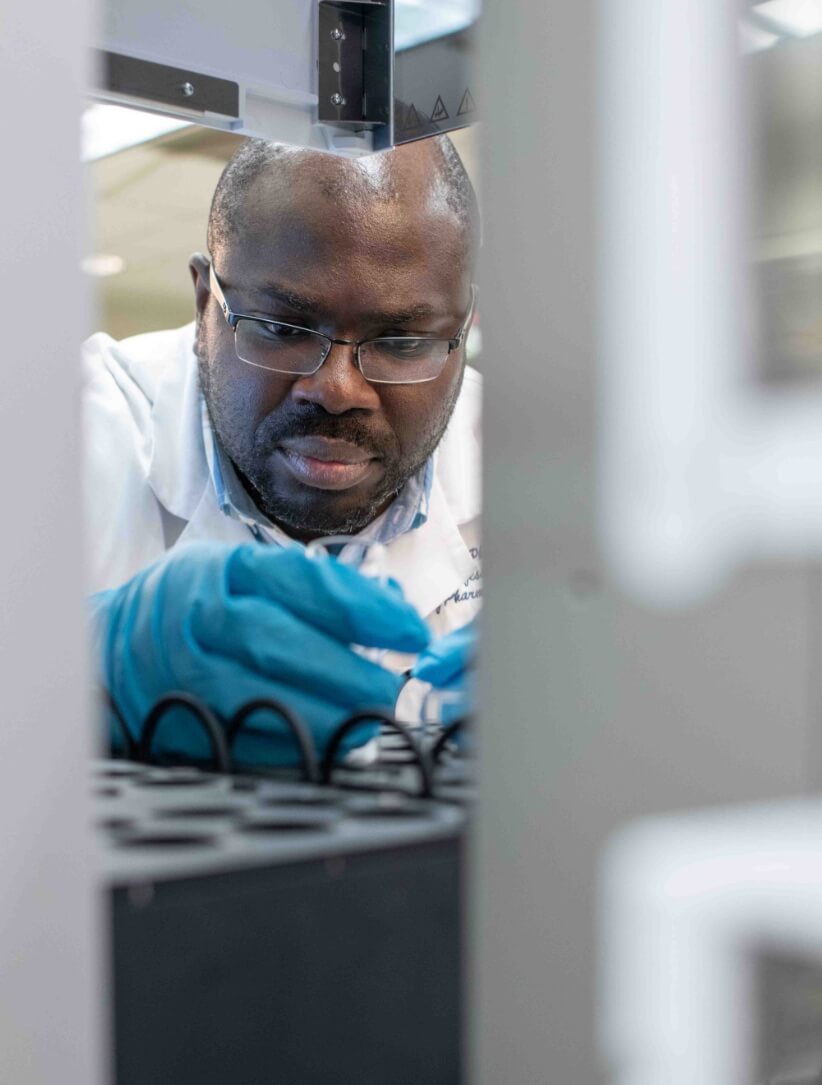 WASHINGTON (September 24, 2019) – Advanced prostate cancer is notoriously difficult to treat. Some tumor cells respond well to chemotherapy while others do not. Thus, when treatment with chemotherapeutic agents seem to be effective, the cancer typically stages a comeback later.
WASHINGTON (September 24, 2019) – Advanced prostate cancer is notoriously difficult to treat. Some tumor cells respond well to chemotherapy while others do not. Thus, when treatment with chemotherapeutic agents seem to be effective, the cancer typically stages a comeback later.
Howard University pharmacy researcher Simeon K. Adesina, R.Ph., Ph.D., is designing a “stealth bomber” approach to fighting the disease on multiple fronts to improve treatment. Adesina recently won an $880,000 National Institutes of Health (NIH) grant to develop the approach further. His treatment approach to prostate cancer sends cancer-fighting nanoparticles where they are needed and destroys the tumor areas without killing healthy cells.
“It’s like a stealth bomber that is able to evade the body’s defense mechanisms and then when it gets to the tumor, drops what it needs to drop,” says Adesina, who also serves as an associate professor in the College of Pharmacy.
The drug delivery system design entails multiple mechanisms of action to thwart the cancer. The nanoparticles deliver docetaxel, the main first-line prostate cancer drug, but adds another agent called brusatol. The second compound has a way of knocking down resistance to docetaxel and inhibits several tumor proliferative pathways. The delivery system is designed to selectively target the tumor without killing healthy cells.
“One of the difficult issues is engineering drugs to go where it’s needed without causing adverse effects,” Adesina says. “If we are able to simultaneously inhibit four or five different cancer-promoting pathways, then you stand a better chance accomplishing a total kill – of eradicating the cancer.”
Indiran Pather, D. Pharm, chair of the Howard University Department of Pharmaceutical Sciences, recognizes that prostate cancer is difficult to treat. However, he adds that Adesina’s work “has the potential to advance knowledge in this field. I congratulate him on the award of the grant and wish him every success in his research.”
Toyin Tofade, Pharm. D., dean of the Howard University College of Pharmacy, also congratulates Adesina on the award. “Dr. Adesina and his team have worked very hard to receive this NIH grant. We are so proud of the work he is doing at the college to advance prostate cancer research and care.”
About Howard University
Founded in 1867, Howard University is a private, research university that is comprised of 13 schools and colleges. Students pursue studies in more than 120 areas leading to undergraduate, graduate and professional degrees. The University operates with a commitment to Excellence in Truth and Service and has produced four Rhodes Scholars, 11 Truman Scholars, two Marshall Scholars, one Schwarzman Scholar, over 70 Fulbright Scholars and 22 Pickering Fellows. Howard also produces more on-campus African-American Ph.D. recipients than any other university in the United States. For more information on Howard University, visit www.howard.edu.
# # #
For media inquiries, contact Sholnn Freeman, Sholnn.freeman@howard.edu




